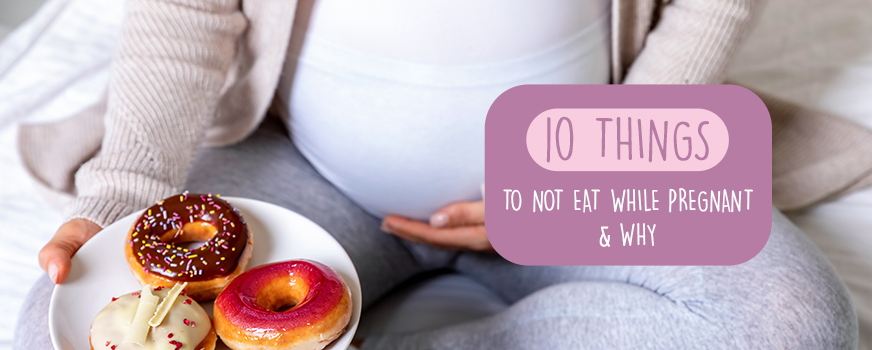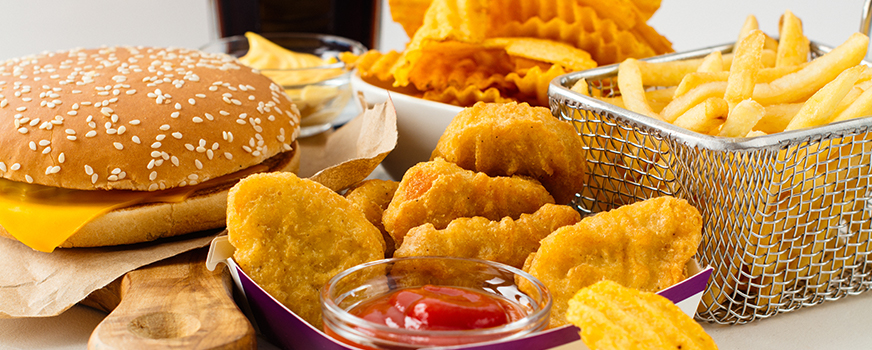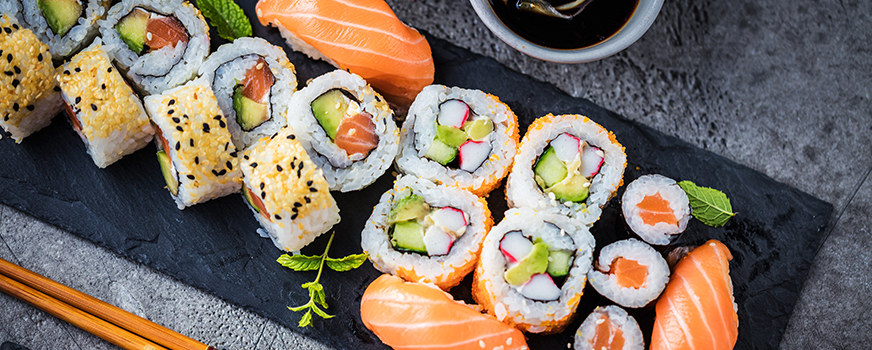
You’ve probably heard the basics of “don’t eat sushi” and “avoid certain cheese,” but why? Unfortunately, pregnancy can put a hold on you eating some of your favorite foods and drinks, but luckily the list of things not to eat is shorter than the list of things you can eat. Keep reading for a list of the top food don’ts and why you should avoid them – or at least cut down your consumption – during your pregnancy.
Food to Avoid When Pregnant
Alcohol
It’s advised to completely avoid drinking alcohol when pregnant, as it increases the risk of miscarriage and stillbirth. Even a small amount can negatively impact your baby’s brain development. Drinking alcohol during pregnancy can also cause fetal alcohol syndrome, which involves facial deformities, heart defects, and intellectual disability. Since no level of alcohol has been proven to be safe during pregnancy, it’s recommended to avoid it altogether.
Caffeine
Pregnant people are generally advised to limit their caffeine intake to less than 200 milligrams (mg) per day. Caffeine is absorbed very quickly and passes easily into the placenta. Because babies and their placentas don’t have the main enzyme needed to metabolize caffeine, high levels can build up. This has been shown to restrict fetal growth and increase the risk of low birth weight at delivery, which is associated with an increased risk of infant death and a higher risk of chronic diseases in adulthood.
High Mercury Fish
Mercury is a highly toxic element. It has no known safe level of exposure and is most commonly found in polluted water. In higher amounts, it can be toxic to your nervous system, immune system, and kidneys. It may also cause serious developmental problems in children, with adverse effects even in lower amounts. Since it’s found in polluted seas, large marine fish can accumulate high amounts of mercury. Therefore, it’s best to avoid high mercury fish while pregnant and breastfeeding.

Processed Junk Foods
There’s no better time than pregnancy to start eating nutrient-dense foods to help both you and your growing little one. You’ll need increased amounts of many essential nutrients, including protein, folate, choline, and iron. Processed junk food is generally low in nutrients and high in calories, sugar, and added fats. While some weight gain is necessary during pregnancy, excess weight gain has been linked to many complications and diseases. These include an increased risk of gestational diabetes, as well as pregnancy or birth complications.
Raw Eggs
Raw eggs can be contaminated with the salmonella bacteria. Symptoms of salmonella infections include fever, nausea, vomiting, stomach cramps, and diarrhea. However, in rare cases, the infection may cause cramps in the uterus, leading to premature birth or stillbirth. To be on the safe side, make sure to always cook eggs thoroughly or use pasteurized eggs. Save those super runny yolks and homemade mayo until after your baby makes their debut.
Undercooked or Raw Meat
Some of the same issues with raw fish affect undercooked meat, too. Eating undercooked or raw meat increases your risk of infection from several bacteria or parasites, including Toxoplasma, E. coli, Listeria, and Salmonella. Bacteria may threaten the health of your little one, possibly leading to stillbirth or severe neurological illnesses, including intellectual disability, blindness, and epilepsy. While most bacteria are found on the surface of whole pieces of meat, other bacteria may linger inside the muscle fibers.
Hot dogs, lunch meat, and deli meat are also of concern, which is sometimes surprising to pregnant people. These types of meat may become infected with various bacteria during processing or storage. Pregnant women should not consume processed meat products unless they’ve been reheated until very thoroughly cooked.

Undercooked or Raw Seafood
This one will be tough for you sushi fans, but it’s an important one. Raw fish, especially shellfish, can cause several infections. These can be viral, bacterial, or parasitic infections, such as Norovirus, Vibrio, Salmonella, and Listeria. Some of these infections may only affect you, causing dehydration and weakness. Other infections may be passed on to your baby with serious, or even fatal, consequences.
Pregnant women are especially susceptible to listeria infections. In fact, according to the Centers for Disease Control and Prevention (CDC), pregnant women are up to 10 times more likely to get infected by Listeria than the general population. Listeria bacteria can be passed to your baby through the placenta, even if you’re not showing any signs of illness. This can lead to premature delivery, miscarriage, stillbirth, and other serious health problems, according to the CDC.
Unpasteurized Milk, Cheese, and Fruit Juice
Raw milk, unpasteurized cheese, and soft-ripened cheeses can contain an array of harmful bacteria, including Listeria, Salmonella, E. coli, and Campylobacter. The same goes for unpasteurized juice, which is also prone to bacterial contamination. These infections can all have life-threatening consequences for an unborn baby. The bacteria can be naturally occurring or caused by contamination during collection or storage. Pasteurization is the most effective way to kill any harmful bacteria, without changing the nutritional value of the products.
Unwashed Produce
The surface of unwashed or unpeeled fruits and vegetables may be contaminated with several bacteria and parasites. These include Toxoplasma, E. coli, Salmonella, and Listeria, which can be acquired from the soil or through handling. Contamination can occur at any time during production, harvest, processing, storage, transportation, or retail. One dangerous parasite that may linger on fruits and vegetables is called Toxoplasma. Most infants who are infected with the Toxoplasma bacteria while still in the womb have no symptoms at birth. However, symptoms such as blindness or intellectual disabilities may develop later in life.
Having a healthy diet while pregnant is necessary, and that sometimes means cutting out some of your favorite foods – even if they are healthy pre- and post-pregnancy. When you’re pregnant, it’s essential to avoid foods and beverages that may put you and your baby at risk. Although most foods and beverages are perfectly safe to enjoy, some, like raw fish, unpasteurized dairy, alcohol, and high mercury fish, should be avoided. Plus, some foods and beverages like coffee and foods high in added sugar, should be limited in order to promote a healthy pregnancy. Take a pause on eating items from the list of food to avoid when pregnant for now, and the wait will be worth it!



